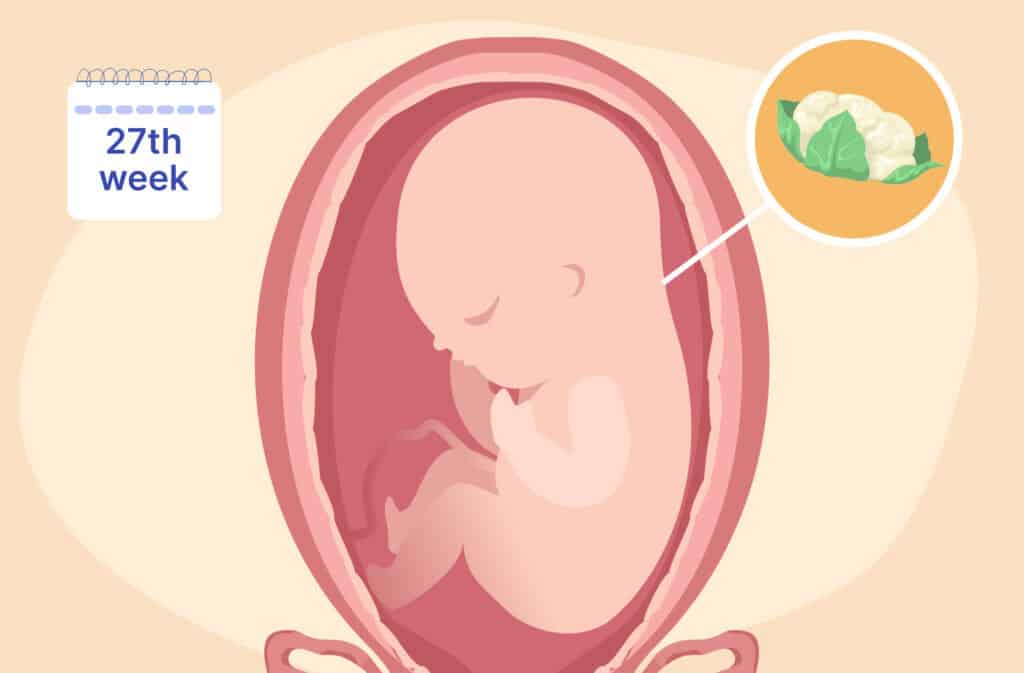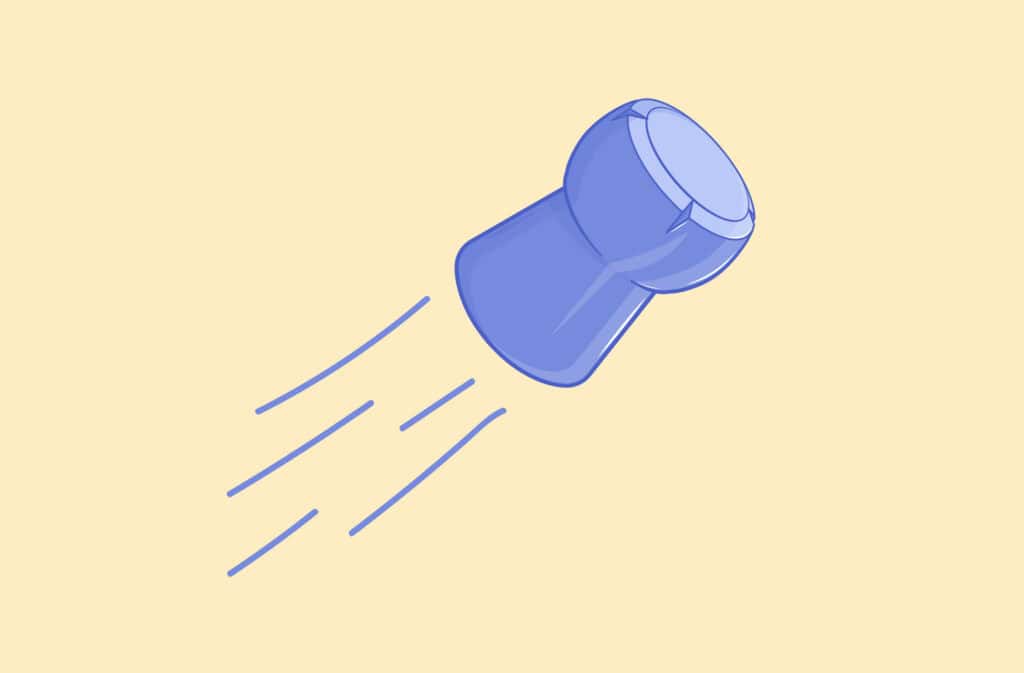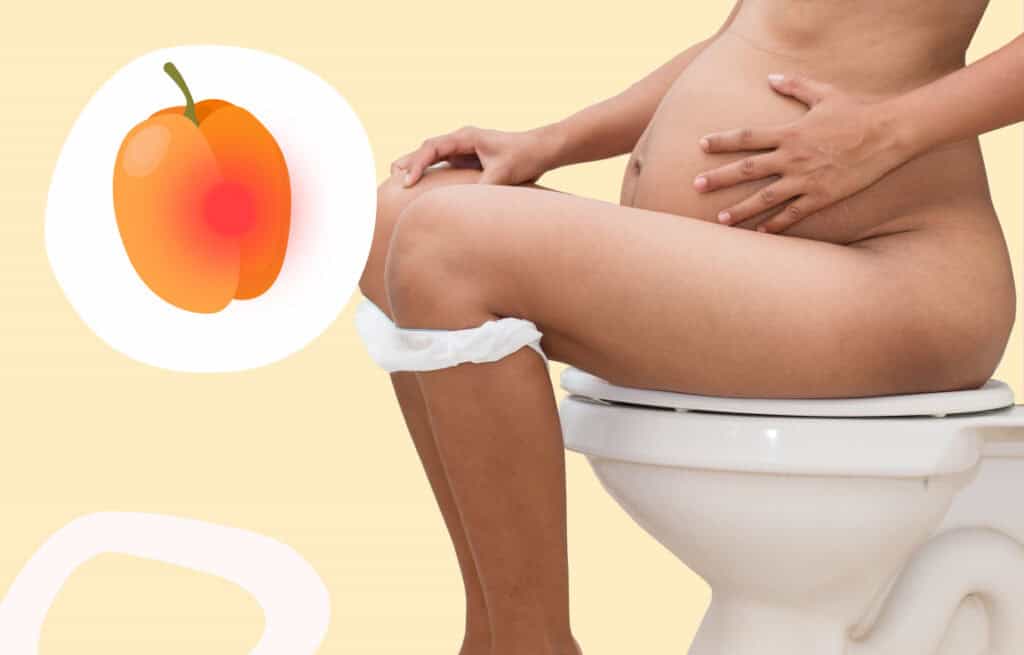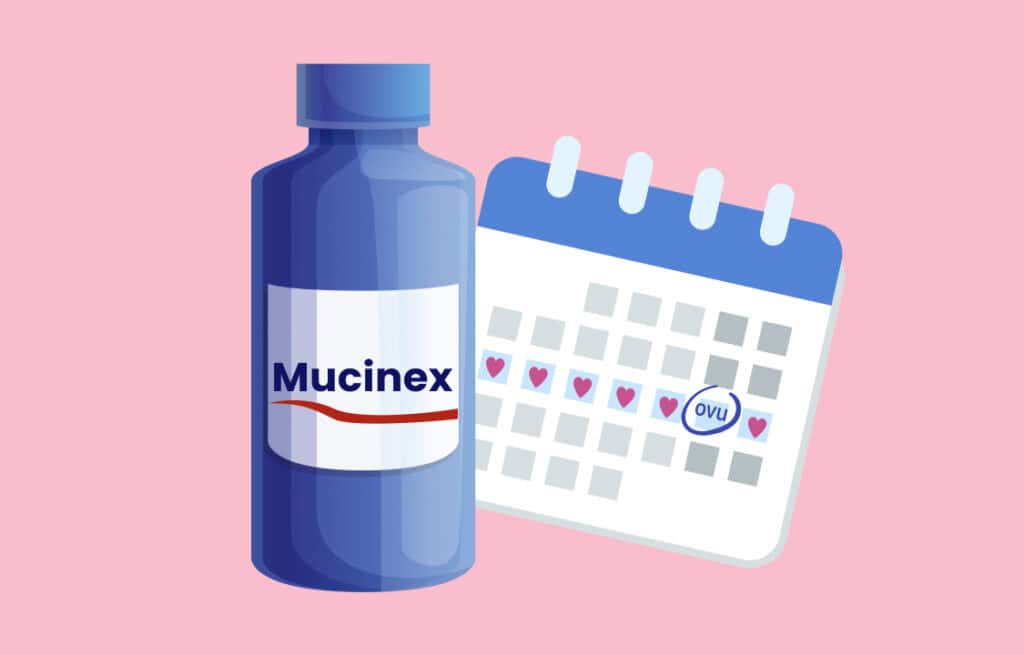Femia > Health Library > Pregnancy > Pregnancy week by week > 27 Weeks pregnant: Baby’s growth, symptoms, and tips for the third trimester
27 Weeks pregnant: Baby’s growth, symptoms, and tips for the third trimester

- Updated Feb 20, 2025
- Published
CRAFTED BY HUMAN
Crafted by human At Femia, we provide accurate and up-to-date information at every stage of your journey, from trying to conceive, pregnancy and postnatal support. All content is created by a real person based on in-depth research and own professional experience. Femia ensures that you will receive expert advice, strict accuracy and a personalized approach from our authors/medical experts. Learn more about our editorial policy.
FACT CHECKED
Fact checked At Femia Health, we maintain the highest standards of editorial excellence in delivering content focused on helping you conceive, guiding you through pregnancy, and supporting you postpartum. Explore our content review principles to learn how we ensure the accuracy and quality of our health and lifestyle tips for every stage of your journey.
At 27 weeks pregnant, your baby is growing quickly, about the size of a head of cauliflower, and refining movements, practicing breathing, and growing rapidly. Your body is adapting with a larger bump, more pronounced movements, and possible new symptoms like leg cramps or heartburn.
You’ve made it to 27 weeks pregnant—congratulations! This week marks the start of your third trimester, a significant milestone in your pregnancy journey. For moms-to-be, this week may bring noticeable changes, from a larger belly to new symptoms like leg cramps or Braxton Hicks contractions. Here’s everything you need to know about week 27, including baby development, symptoms, and essential self-care tips.
Get personalized insights every step of the way with the Femia mobile app
Pregnancy symptoms at 27 weeks
Here are the common symptoms you may experience during week 27:
Extra body hair
Many women experience thicker, fuller hair during pregnancy due to hormonal changes that keep more hair in the growth phase. However, this may also lead to increased body and facial hair growth. Safe hair removal methods during pregnancy include waxing, tweezing, shaving, and threading, while laser hair removal and depilatories should be avoided.
Restless legs
Restless Leg Syndrome (RLS) can cause uncomfortable sensations in your legs, especially in the evening or while trying to sleep. Hormonal changes, iron deficiencies, and circulatory shifts may contribute to RLS. Avoid caffeine and smoking, and try stretching, exercise, and relaxation techniques to relieve symptoms.
Urinary incontinence
Increased blood volume and relaxation of pelvic muscles can cause urinary incontinence during pregnancy. Staying hydrated and practicing pelvic floor exercises can help manage symptoms. If symptoms persist, talk to your doctor to rule out infections and receive tailored guidance.
Swelling
Swelling, especially in the feet and ankles, is common in the third trimester due to hormonal changes and fluid retention. Elevating your feet, wearing compression socks, and staying hydrated can help reduce swelling. If swelling is excessive or occurs suddenly, especially in the face or hands, seek medical advice.
Weight gain
Weight gain during pregnancy should be monitored to ensure you’re staying within healthy ranges. For a healthy pregnancy, most women gain between 25-35 pounds. Speak to your provider if you’re unsure about your weight gain or need help managing it.
Pelvic pain
Pelvic pain, including sharp or throbbing discomfort in your hips or groin, is common as pregnancy progresses. Wearing a belly band, using a pregnancy pillow, and practicing regular exercise can help alleviate discomfort. If pelvic pain is severe, discuss physical therapy options with your provider.
Anxiety
Anxiety during pregnancy is relatively common, especially as you approach the later stages. Hormonal changes, concerns about labor, and the upcoming changes to your life and family dynamics can all contribute to feelings of anxiety. It’s important to address these feelings by speaking with your healthcare provider, practicing relaxation techniques, and seeking support from loved ones or a mental health professional if needed.
Pregnancy brain
Many women report experiencing forgetfulness or “brain fog” during pregnancy, often referred to as “pregnancy brain.” Hormonal fluctuations, sleep disturbances, and stress can all contribute to cognitive changes, such as difficulty focusing or remembering things. While it can be frustrating, pregnancy brain is typically temporary and can be managed by staying organized, reducing stress, and making time for rest.
Braxton Hicks contractions vs true labor
| Aspect | Braxton Hicks contractions | True labor |
|---|---|---|
| Frequency | Irregular, not progressively closer together | Regular intervals, getting closer together |
| Intensity | Weak, often described as mild discomfort | Increases in strength over time |
| Duration | Short, usually lasting less than 30 seconds | Longer, lasting 30-70 seconds per contraction |
| Location of pain | Felt mainly in the front of the abdomen | Starts in the back and radiates to the front |
| Effect of movement | Stops or decreases with activity or a change in position | Continues regardless of movement or position changes |
| Cervical changes | Does not cause dilation or thinning of the cervix | Causes the cervix to dilate and thin out (effacement) |
This concise comparison can help distinguish between the two types of contractions.
👉Find out more: Navigating week 26: Baby’s Growth, symptoms, and expert tips
Your body at 27 weeks pregnant
At 27 weeks pregnant, your body is adjusting to the growing demands of your baby. Your uterus continues to expand, and you may feel an increase in pelvic pressure as your baby grows larger and lower. You might also start experiencing more pronounced physical discomfort, such as back pain, as your center of gravity shifts and your body prepares for childbirth.
Common experiences at this stage also include changes in your skin, like stretch marks or darkening areas. The increase in blood volume and hormonal changes may cause varicose veins or more noticeable veins on your breasts and legs. It’s a good time to focus on self-care: practice relaxation techniques, get enough sleep, and stay active with low-impact exercises to support both your body and your baby’s health.
27-Week pregnant belly
Your baby bump at 27 weeks is likely firm and well-defined. Many women feel more pronounced baby movements, and their belly’s shape may change as the baby adjusts positions. Maternity clothes remain essential for comfort.
Baby development at 27 weeks
At 27 weeks, your baby is continuing to grow and develop rapidly. Their eyes are now fully formed and can open, allowing them to respond to light by moving away from it. Your baby can also blink and may even start to practice eye movements, although their vision is still blurry.
Baby’s nervous system
The nervous system is undergoing rapid development, with the brain growing more complex and continuing to form connections. Your baby’s ability to regulate their body temperature is also improving as they develop fat stores under their skin.
Getting ready to breathe
Your baby is practicing essential breathing movements by inhaling and exhaling amniotic fluid. Their lungs are developing further, preparing them for breathing air after birth. Although their lungs aren’t fully mature yet, they are getting stronger and better prepared to handle the outside world.
Hiccups in the womb
The rhythmic movements you’re feeling could be fetal hiccups. These episodes usually last only a few moments and are completely normal, so sit back and enjoy the odd sensation.
27-Week baby size
The 27-week-old baby size is approximately 14.5 inches long and weighs around 2 pounds, about the size of a head of cauliflower. This growth supports their developing muscles and organs.
27-Week ultrasound
A 27-week ultrasound can show your baby’s active movements, such as kicking or stretching, and provide insights into their growth and position. You might see detailed facial features and even catch them sucking their thumb.
27-Week preemie
Babies born at 27 weeks, known as micro-preemies, have up to 64.2% survival rate with advanced NICU care. They require breathing support, feeding tubes, and incubators to regulate body temperature. At this stage, their lungs, brain, and digestive systems are still maturing. While developmental delays are possible, early interventions help most grow into healthy children.
Get personalized insights every step of the way with the Femia mobile app
What should I be doing at 27 weeks pregnant?
- Track baby movements: Monitoring your baby’s movements helps ensure they’re healthy and active.
- Prepare for birth classes: Consider signing up for prenatal classes to learn about labor and newborn care.
- Focus on nutrition: Incorporate iron-rich foods into your diet to support increased blood volume.
- Stay active: Gentle exercises like walking or swimming can reduce discomfort and improve circulation.
👉Find out more:
28 Weeks pregnant: Entering the third trimester with key insights
29 Weeks pregnant: Baby’s growth, symptoms, and preparation for labor
Tests and vaccines to expect at 27 weeks pregnant
At 27 weeks pregnant, as you enter the third trimester, your healthcare provider will continue to monitor your health and your baby’s progress through the following tests:
- Blood pressure monitoring: Your blood pressure will be checked at every visit to screen for preeclampsia or other pregnancy-related hypertension conditions.
- Fetal heartbeat and movements: Your provider will listen to your baby’s heartbeat with a Doppler and discuss movement patterns to ensure your baby is active and developing as expected.
- Urine test: A urine sample will be tested for protein (a sign of preeclampsia).
- The Tdap vaccine: College of Obstetricians and Gynecologists (ACOG) recommends that pregnant individuals receive the Tdap vaccine between the 27th and 36th weeks of each pregnancy, preferably during the earlier part of this time frame. This vaccine helps protect your baby against whooping cough (pertussis) after birth. Be sure to discuss this important vaccine with your healthcare provider during your next visit.
- Glucose tolerance test (if not already done): If you haven’t already had your GTT, it will likely be performed this week to screen for gestational diabetes. If results indicate high glucose levels, further testing or dietary recommendations may follow.
- Fundal height measurement: Your provider will measure the distance from your pubic bone to the top of your uterus to ensure your baby’s growth aligns with gestational expectations.
- Ultrasound (if needed): While not routine, an ultrasound may be suggested to monitor your baby’s growth, check amniotic fluid levels, or assess any specific concerns.
These tests at 27 weeks help ensure you and your baby are on track for a healthy pregnancy. Be sure to mention any changes, such as reduced movements or new symptoms, during your visit.
Health tips and self-care at 27 weeks pregnant
Consider birth classes
At 27 weeks, it’s a great time to start thinking about childbirth education classes. These classes can help you feel more prepared and informed about what to expect during labor and delivery. Whether you choose an in-person class or an online course, birth classes provide valuable information on pain management techniques, what to pack for the hospital, and the stages of labor. Consider discussing with your partner and healthcare provider to find the best class for your needs.
Daily activities
Stay active with light exercises to help improve circulation and reduce swelling. Walking, swimming, and prenatal yoga are great options for staying fit during pregnancy. At the same time, be mindful of rest, especially if you experience swelling or fatigue. Short breaks throughout the day can help you stay comfortable. Avoid standing or sitting for long periods, and if you do feel swelling, try elevating your feet when sitting.
Eat a balanced diet
Make sure to consume a well-rounded diet that includes lean protein, fruits, vegetables, whole grains, and healthy fats. This is especially important as your baby is growing quickly and needs plenty of nutrients. Focus on foods rich in iron, calcium, and folic acid. If you have any concerns about your nutrition, talk to your healthcare provider or a nutritionist for advice.
Stay hydrated
Drink plenty of water throughout the day to keep hydrated. Staying hydrated is essential for both you and your baby, and it can also help reduce swelling. If you’re finding it difficult to drink plain water, try adding a slice of lemon or cucumber for flavor. Avoid sugary drinks, as they can lead to unnecessary weight gain and blood sugar fluctuations.
Practice relaxation techniques
As your body adjusts to the changes of pregnancy, take time each day to relax and relieve stress. Meditation, deep breathing exercises, or listening to calming music can help lower stress levels and improve your overall well-being. Setting aside time to unwind can help you feel more balanced and energized.
Questions from the Femia community
How to track baby movements?
Tracking your baby’s movements is important starting around week 27. Choose a quiet time, lie down, and pay attention to how your baby typically moves. Every baby is different, so it’s important to recognize your baby’s unique movement patterns. According to recent updates (2021) from the American College of Obstetricians and Gynecologists (ACOG), routine kick counting is no longer recommended as a primary method for fetal monitoring due to limited evidence of its effectiveness and potential to increase anxiety. However, if you notice any significant decrease in your baby’s usual activity, it’s essential to call your physician or clinic immediately.
What’s the dark vertical line on my tummy? Will it go away?
The dark line on your belly called the linea nigra, is caused by hormonal changes during pregnancy. It usually fades a few months after delivery, although it may not disappear completely for some women.
Why do I feel short of breath?
Your growing uterus is pressing against your diaphragm, making it harder to take deep breaths. Practice slow, deep breathing and maintain good posture to help open up your lungs.
Is the baby fully matured in week 27?
At 27 weeks, your baby is not fully matured but is in a critical period of development. Their organs, including the lungs and brain, are still maturing, but they are capable of surviving with medical assistance if born at this stage. The baby will continue to develop and gain weight until birth.
Should I be working at 27 weeks pregnant?
It depends on how you're feeling and your individual health. If you're comfortable and your doctor gives you the go-ahead, it's generally fine to continue working at 27 weeks. However, it's important to listen to your body and take breaks as needed. If you experience discomfort, fatigue, or complications, consult your healthcare provider for advice.
The bottom line
At 27 weeks pregnant, your baby is practicing movements, growing rapidly, and preparing for life outside the womb. Your body is adjusting to a larger bump, increased symptoms, and the need for self-care. Focus on tracking your baby’s movements, staying active, and preparing for the exciting weeks ahead.
References
- “27 Weeks Pregnant: Symptoms, Baby Development & Tips.” BabyCenter, www.babycenter.com/pregnancy/week-by-week/27-weeks-pregnant.
- “Week 27 of Pregnancy: Symptoms, Baby Development & More.” What to Expect, www.whattoexpect.com/pregnancy/week-by-week/week-27.aspx.
- “27 Weeks Pregnant: Baby Development, Symptoms & Tips.” NHS, www.nhs.uk/pregnancy/week-by-week/1-to-12/27-weeks/.
- “Pregnancy Week 27: What to Expect.” American Pregnancy Association, www.americanpregnancy.org/healthy-pregnancy/week-by-week/27-weeks-pregnant/.
- “Survival and Impairment of Extremely Premature Infants: A Systematic Review.” Pediatrics, vol. 143, no. 2, 2019, pp. e20180933. American Academy of Pediatrics, https://publications.aap.org/pediatrics/article-abstract/143/2/e20180933/37351/Survival-and-Impairment-of-Extremely-Premature?redirectedFrom=fulltext.
- American College of Obstetricians and Gynecologists. “The Tdap Vaccine and Pregnancy.” ACOG, December 2020, https://www.acog.org/womens-health/faqs/the-tdap-vaccine-and-pregnancy.
- Smith, Jane, et al. “Updated Guidelines on Fetal Movement Monitoring and Its Implications for Practice.” MCN: The American Journal of Maternal/Child Nursing, vol. 49, no. 6, 2024, pp. 321–326. Lippincott Williams & Wilkins, https://journals.lww.com/mcnjournal/pages/articleviewer.aspx?year=2024&issue=11000&article=00002&type=Fulltext. Accessed 14 Nov. 2024.

Discover things to avoid after losing mucus plug and what to do next. Learn how long after losing mucus plug labor starts and what happens to your body. Expert advice from Femia.

Learn the in-depth guide about pregnancy hemorrhoids, including their causes, symptoms, treatment, prevention, and different stages of hemorrhoids during pregnancy.

Considering using Mucinex to help you get pregnant? Find out whether the Mucinex pregnancy trick is fact or fiction, how to use it, and who should stay away.

